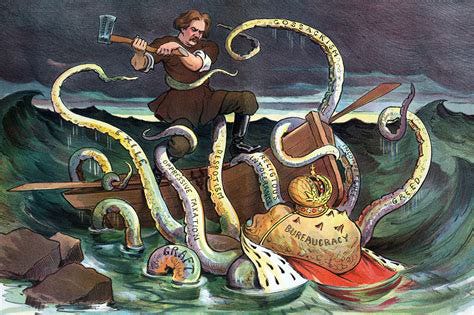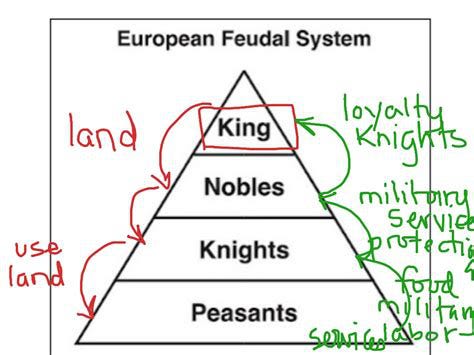Many of us are happy to see the changes in our nation's capitol, with hope that the “deep state” will give way to a semblance of normalcy, with decisions being made by elected leaders rather than shadowy bureaucrats. I think a good name for what we have been living under would be Bureaucratic Feudalism, a moniker coined by E. M. Burlingame in his short book The Eternal War, which is about the never ending conflict between two major world views that lead to either massive bureaucratic states with limited freedom or relatively free societies. It can be found at Amazon at:
https://www.amazon.com/Eternal-War-M-Burlingame/dp/B0BXN7DY4R
The idea of bureaucratic feudalism is that, although a certain amount of bureaucracy is necessary for the smooth functioning of ones country, should it grow to unmanageable levels it can become in effect a sort of feudalism, wherein we have a class of nobles running the bureaucracy and a nation of serfs living at their suffrage. There seems to be a natural human tendency for people to begin to look down on those over whom they hold power, so once the bureaucracy obtains sufficient power a class of nobles is inevitability formed.
At least in European feudalism the king, the nobles and the knights were expected to protect the land the people. Now it's more of a lead from behind system.
It's not that feudalism was planned, it's just that a bureaucracy doesn't have much to stop it from growing and becoming a nuisance. We have various names for it here in the US, the Deep State, the Blob, the Permanent Bureaucracy, but it amounts to the bureaucracy growing like a cancer until it becomes a problem.
From the American Heritage dictionary,
bureaucracy /byoo͝-rŏk′rə-sē/
noun
Administration of a government chiefly through bureaus or departments staffed with nonelected officials.
The departments and their officials as a group.
"promised to reorganize the federal bureaucracy."
Management or administration marked by hierarchical authority among numerous offices and by fixed procedures.
"The new department head did not know much about bureaucracy."
The administrative structure of a large or complex organization.
"a midlevel manager in a corporate bureaucracy."
An administrative system in which the need or inclination to follow rigid or complex procedures impedes effective action.
"innovative ideas that get bogged down in red tape and bureaucracy."
A system of carrying on the business of government by means of departments or bureaus, each under the control of a chief, in contradiction to a system in which the officers of government have an associated authority and responsibility; also, government conducted on this system.
Government officials, collectively; -- used especially of nonelected government officials.
The American Heritage® Dictionary of the English Language, 5th Edition • More at
https://www.wordnik.com/words/bureaucracy
As bureaucracy grows the ability to function and generally make a living diminishes.
"Hell hath no fury like a bureaucrat scorned." ~ Milton Friedman
"In our time ... a man whose enemies are faceless bureaucrats almost never wins. It is our equivalent to the anger of the gods in ancient times. But those gods you must understand were far more imaginative than our tiny bureaucrats. They spoke from mountaintops not from tiny airless offices. They rode clouds. They were possessed of passion. They had voices and names. Six thousand years of civilization have brought us to this." ~ Chaim Potok
https://drp314.substack.com/p/the-new-feudalism
Consider the hypothetical case of an ordinary, moderate sized manufacturing company. It might be started by a small group of exceptional engineers and entrepreneurs, or even a single one. It has a reward/punishment curve that favors accomplishment; one is richly rewarded for making a great improvement, an unexceptional worker is rewarded for doing a competent job, and you are only punished for doing really bad things. Over time the company becomes more successful, and tends to move away from innovation in favor of increasing production and maintaining it's status quo, and the reward/punishment curve moves in the direction of less reward and more punishment.
"Bureaucracy destroys initiative. There is little that bureaucrats hate more than innovation, especially innovation that produces better results than the old routines. Improvements always make those at the top of the heap look inept. Who enjoys appearing inept?" ~ Frank Herbert
Meanwhile the bright, young engineers and entrepreneurs have tired of the place and moved on. Eventually the company has been making their widgets a long time, the place is run by uninspired middle managers who don't care for innovation and don't want anything to change, and the reward/punishment curve allow for little reward but much punishment – a fact that drives out the innovators. The company might grind along in it's ossified state for some time, but it won't last in that situation; it might be bought or just go bankrupt. This is sort of like a forest that has new trees springing up while older ones mature or die. It's not so simple, of course, and many companies have managed to avoid long term ossification; this is just to illustrate a general tendency. (Of course the Covid thing tended to take out the new trees, and lots of government controls on business will tend to favor the ossified ones over the new startups.)
"I do not rule Russia: ten thousand clerks do." ~ Nicholas II of Russia
"Bureaucracy is a giant mechanism operated by pygmies." ~ Honore de Balzac
The point of the above illustration is that government organizations are sort of like companies that do not have to worry about going away, they just go on and on, and they can become larger and more punishment oriented as time goes on.
"The bureaucracy is expanding to meet the needs of the expanding bureaucracy."
~ Oscar Wilde
"An efficient bureaucracy is the greatest threat to liberty." ~ Eugene McCarthy
So now we are living in a country with a government bureaucracy that has done just that, so we have to hope that the lords of DOGE do the right thing and hack away.
"The atmosphere of officialdom would kill anything that breathes the air of human endeavour, would extinguish hope and fear alike in the supremacy of paper and ink." ~ Joseph Conrad
An inevitable outgrowth of a Bureaucracy run amok is a two tier justice system since, being in control of said system, they will inevitably use it to their advantage. Anyone noticed such goings on?
Stay Brave, Stay Free






Pournelle's iron law of bureaucracy states:
"In any bureaucracy, the people devoted to the benefit of the bureaucracy itself always get control of the organization, and those dedicated to the goals the bureaucracy was established to achieve have less and less influence, and are sometimes eliminated entirely."
- Scientist and author Jerry Pournelle
Thomas Sowell writes about how a government agency once created does good for about 10 years then it becomes captured.
After that it works for the industry it was supposed to control and against the people it was supposed to protect.